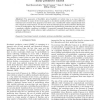Free Online Productivity Tools
i2Speak
i2Symbol
i2OCR
iTex2Img
iWeb2Print
iWeb2Shot
i2Type
iPdf2Split
iPdf2Merge
i2Bopomofo
i2Arabic
i2Style
i2Image
i2PDF
iLatex2Rtf
Sci2ools
105
click to vote
AUTOMATICA
2010
2010
Explicit use of probabilistic distributions in linear predictive control
: The guarantee of feasibility given feasibility at initial time is an issue that has been overlooked by many of the recent papers on stochastic model predictive control. Effective solutions have recently been proposed, but these carry considerable online computational load and a degree of conservativism. For the case that the elements of the random additive disturbance vector are independent, the current paper ensures that probabilistic constraints are met and that a quadratic stability condition is satisfied. A numerical example illustrates the efficacy of the proposed algorithm, which achieves tight satisfaction of constraints and thereby attains nearoptimal performance.
Additive Disturbance Vector | AUTOMATICA 2007 | AUTOMATICA 2010 | Model Predictive Control | Online Computational Load |
Related Content
| Added | 24 Dec 2010 |
| Updated | 24 Dec 2010 |
| Type | Journal |
| Year | 2010 |
| Where | AUTOMATICA |
| Authors | Basil Kouvaritakis, Mark Cannon, Sasa V. Rakovic, Qifeng Cheng |
Comments (0)

